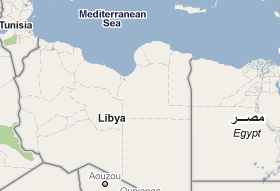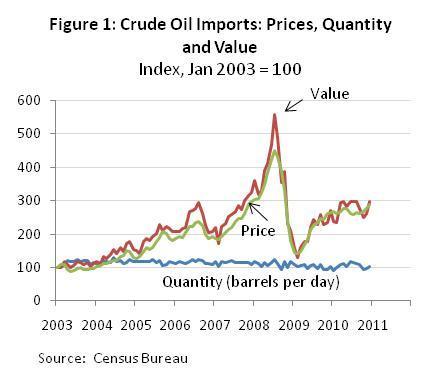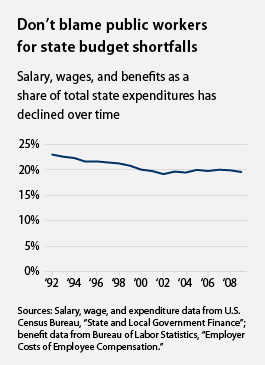Matthew Yglesias's Blog, page 2391
March 13, 2011
Two Cheers For Nuclear Safety

With what's happening in Japan, it's natural to see renewed concern about the safety of nuclear power and I'm certainly glad we didn't vote for the candidate who dismissed the idea that nuclear energy ought to be safe. But I do think it's worth speaking up for a nuclear industry a bit. The question is safe compared to what? The Alaskan king crab fishery is very dangerous, but it's safer than a couple of other forms of fishing. And by the same token, it's hardly the case that coal mining or drilling for oil or risk-free alternatives.
That's all to say that while nuclear looks bad on safety grounds versus clean energy or efficiency, I don't see any particular reason to see these safety concerns as more pressing than concernes around the fossil fuels that provide the majority of our energy.


Genuine Question

I'm a little confused by this idea of the Arab League calling on western powers to intervene militarily in Libya. If the Arab League is so eager to see an intervention, why don't Arab League member states intervene in Libya? Egypt, in particular, is conveniently located adjacent to Libya and specifically to the opposition-held portion of Libya. Even better, Egyptian soldiers would speak the same language as Libyan people.
Of course mounting a intervention would be expensive for Egypt, but there are plenty of rich Gulf states that could help defray the costs. The point is that it seems to me like an Arab League that sincerely wanted to help the Libyan rebels has plenty of ways of doing so while the kind of western intervention they're calling for seems very unlikely. But is there some logistical or geographical angle I'm missing here?


PJ Crowley Stepping Down As State Department Spokesman Under White House Pressure

Denouncing the US military's maltreatment of a prisoner is exactly the sort of thing you would expect would get a State Department spokesman fired, but in a just world this isn't how things would be playing out:
P.J. Crowley is abruptly stepping down as State Department spokesman under pressure from White House officials because of controversial comments he made last week about the Bradley Manning case, CNN has learned from senior officials familiar with the matter.
Manning is alleged to have committed serious crimes. The correct response would be to put him on trial. To hold a person without trial in solitary confinement under degrading conditions is a perversion of justice.


Huckabee, Romney, and the Beast
Karl Smith says progressives should wake up to the fact that we're winning the argument, and neither Mike Huckabee nor Mitt Romney seriously disagrees with the idea of universal health care. I would note that the converse is also true—conservatives seem to be winning the argument about taxes, and what Barack Obama's proposed in this regard won't raise enough money to cover his program. Via Tyler Cowen, Joseph Daniel Ura and Erica Socker argue (PDF) that these are related phenomena:
The notion of starving the beast has been an important justification for major elements of the fiscal program advocated by many Republicans and conservatives over the last three decades. While the idea of restraining government spending by limiting government revenues has an intuitive appeal, there is convincing evidence the reducing federal tax rates without coordinated reductions in federal spending actually produces long-term growth in spending. This seemingly perverse result is explained by Buchanan's theory of "fiscal illusion." By deferring the costs of government services and benefits through deficit financing, starve the beast policies have the effect of lowering the perceived price of government in the minds of many citizens. We assess the principal behavioral prediction of the fiscal illusion strategy. Incorporating estimates of the effects of federal deficits into a standard substantive model of Stimson's mood index, we find strong support for a subjective price-driven theory of demand for government. In particular, we find that the size of the federal budget deficit is significantly associated greater demand for government services and benefits.
I think these kinds of things are difficult to prove statistically, but it's a provocative argument. The way I see it, when recent Democratic Presidents (Bill Clinton, Barack Obama) have proposed increased in non-defense spending, they've insisted that the increases be "paid for" by offsetting spending cuts and tax hikes. The proposed offsets, however, are politically challenging to pass and the need to secure support for them has restrained Clinton/Obama spending increases. The George W Bush administration, by contrast, both proposed tax cuts with no spending offsets (in 2001 and 2002) and also proposed non-defense spending increases with no offsetting tax hikes (the Medicare bill being the biggest, but also ESEA re-authorization, farm bill reauthorization, and the 2005 energy bill).

Oil Imports
Insightful chart from Mark Doms at the Commerce Department:

A trade deficit widening because Americans are getting more or better goods from abroad has very different implications from a trade deficit widening because Americans are getting the exact same quantity and quality of foreign goods but just paying more for them.


Simon Johnson's TARP Testimony
I recommend reading in full Simon Johnson's congressional testimony on TARP from about ten days ago. It starts with some Real Talk for bailout haters:
5) There is no question that passing the TARP was the right thing to do. In some countries, the government has the authority to provide fiscal resources directly to the banking system on a huge scale, but in the United States this requires congressional approval. In other countries, foreign loans can be used to bridge any shortfall in domestic financing for the banking system, but the U.S. is too large to ever contemplate borrowing from the IMF or anyone else.
That's important to keep in mind. I know some serious people on the left (Dean Baker) and the right (Scott Sumner) who think this analysis is wrong and that the Fed could/should have prevented economic collapse without this intervention. But some conventional wisdom has emerged among activists that only corrupt capture by the banking establishment can explain belief in the necessity of TARP. Simon Johnson is not, I think, corruptly captured by the banking establishment.
Now the key implementation problems:
10) Seen in this context, TARP was badly mismanaged. In its initial implementation, the signals were mixed – particularly as the Bush administration sought to provide support to essentially insolvent banks without taking them over. Standard FDIC-type procedures, which are best practice internationally, were applied to small- and medium-banks, but studiously avoided for large banks. As a result, there was a great deal of confusion in financial markets about what exactly was the Bush/Paulson policy that lay behind various ad hoc deals.
11) The Obama administration, after some initial hesitation, used "stress tests" to signal unconditional support for the largest financial institutions. By determining officially that these firms did not lack capital – on a forward looking basis – the administration effectively communicated that it was pursuing a strategy of "regulatory forbearance" (much as the US did after the Latin American debt crisis of 1982). The existence of TARP, in that context, made the approach credible – but the availability of unconditional loans from the Federal Reserve remains the bedrock of the strategy.
I think point 11 remains unduly appreciated. Note that one reason the Obama administration chose this approach is that the alternatives to regulatory forbearance and recapitalization through profits would involve higher not lower fiscal costs than was involved with the grossly unpopular TARP (whose fiscal costs have actually been extremely low). The alternative to regulatory forbearance would have required the taxpayers to step up with additional capital in a way that would have played in the press as "giving even more money to the big banks." But failing to pony up the cash ended up being even more favorable to the bankers:
14) Exacerbating this issue, TARP funds supported not only troubled banks, but also the executives who ran those institutions into the ground. The banking system had to be saved, but specific banks could have wound down and leading bankers could and should have lost their jobs. Keeping these people and their management systems in place serious trouble for the future.
15) The implementation of TARP exacerbated the perception (and the reality) that some financial institutions are "Too Big to Fail." This lowers their funding costs, probably by around 50 basis points (0.5 percentage points), enabling them to borrow more and to take more risk with higher leverage.
Not only the institutions, but the specific actors managing the institutions have been largely sheltered from downside risk.


March 12, 2011
Cities and Cities
I sort of agree with what Tom Philpott is saying here about the basic irrelevance of subsidizing rural America to the fate of America's cities.
But I think that it's important to try to be clear about what we mean by the word "city." In an economic context, the most relevant concept is often that of a "metropolitan area"—a socially and economically integrated set of places that cross municipal boundaries. That's different from "city," a central municipality as opposed to a "suburb" which is a municipality that's near a central municipality. And that's also different from "city" in the sense of a walkable urban neighborhood as opposed to a "suburban" auto dependent neighborhood. Washington DC the metropolitan area is one of the richest in America, but Washington DC the municipality is merely above average. The Washington DC metro area also includes a large minority of transit-oriented walkable urban neighborhoods. Many of these neighborhoods are in the Washington DC municipality but some of them are in Arlington County, VA or Montgomery County, MD and some of the neighborhoods in the DC municipality are very auto-oriented and suburban and feel.
When someone talks about the economic value of cities that person (especially if he's Ed Glaeser) could be plausibly talking about the economic value of metropolitan areas, in which case subsidization of rural and micropolitan places clearly is relevant. Alternatively, that person (especially if he's Christopher Leinberger) could be plausibly talking about the economic value of walkable urban neighborhoods, in which case subsidization of rural and micropolitan places doesn't seem relevant to me. Meanwhile, if I'm complaining about structural problems in city governance then I'm probably talking about municipalities, which is a whole different thing. I would put this all together by saying that metropolitan areas (mostly composed of people living in suburban neighborhoods in suburban municipalities) benefit from the existence of a strong urban core (composed of people living in walkable urbanist neighborhoods, most of them presumably in the central city municipality) which is more likely to happen if you have a functional municipal political system (in the central city municipality). That's because if one particular suburban jurisdiction starts to be malgoverned, firms and households that want to be located in suburban neighborhoods can fairly easily relocate to a different-but-similar suburban neighborhoods in a different suburban jurisdiction. But in most cases, a firm or household that wants to be in a urban neighborhood often can't just leave the central municipality for a different jurisdiction, it would have to go to a whole different metropolitan area.


Nukes and Public Sector Failure
Today's nuclear troubles in Japan seem to me like yet another reminder of how fundamentally odd American conservatives' love for this particular modality of electricity generation is. The underlying presumption of the idea of safely operating nuclear plants, after all, is that the United States Government is capable of effectively designing and enforcing appropriate regulations and appropriately designing and implementing appropriate emergency response capacity. And yet in most contexts, conservatives insist that any public sector undertaking is necessarily going to end up as poorly run as the worst DMV line in America.
What's even odder, is that civilian nuclear power isn't the only exception conservatives make to their "the government can't do anything right." They also tend to think that government bureaucracies can very successful manage stockpiles of nuclear weapons and invasions of medium-sized foreign countries. To me this sort of "if it goes wrong, tons of people die" scenario would seem like a good time to be unusually concerned about the possibility that the government's not up to the job. But conventional thinking on the right is that that's backwards.


Kobe Bryant Should Shoot Less
John Hollinger on LA's loss to the Heat: "There's no way to sugarcoat this: Kobe's me-on-five routine at the end of L.A.'s 94-88 loss to Miami cost the Lakers the game. Instead of complaining about not getting a call on one of the most ridiculous shots of the bunch, a contested 3-point jack with a fresh shot clock at the 1:06 mark, Bryant might instead have pondered how he could have gotten an easier look for himself or, God forbid, one of the other four guys out there with him."
It's worth making the point quantitatively. Kobe Bryan's .552 True Shooting Percentage is worse than the marks offered by Andre Bynum, Lamar Odom, Pau Gasol, and Matt Barnes. Clearly, none of those guys play Kobe's role in the offense and perhaps couldn't carry the load to the extent that he does. But the numbers suggest, at minimum, that at the margin he needs to distribute the ball more widely.


Chart of the Day
Is employee compensation driving state budget woes? No:

In the short-term, the problem for state budgets is that the recession caused a drop in tax revenues. In the longer-term, the main issue is Medicaid costs.


Matthew Yglesias's Blog
- Matthew Yglesias's profile
- 72 followers



